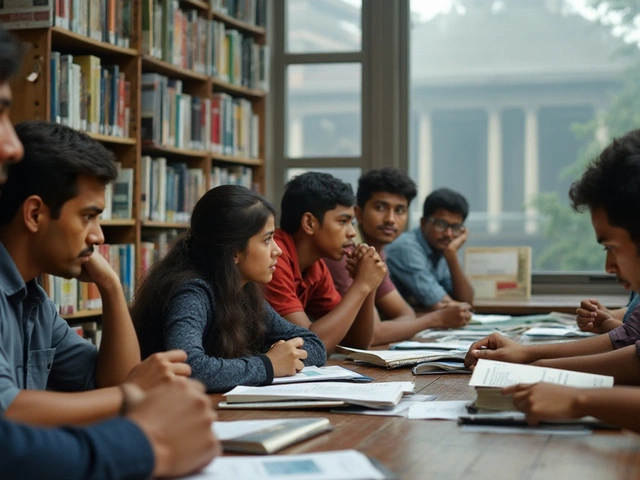When it comes to preparing for the IIT JEE, the first thought that often crosses a student's mind is enrolling in coaching classes. However, diving into self-study might just be an equally potent path to achieving your dream rank. With the right mindset and resources, the self-study route empowers aspirants to tailor their learning pace, sparking creativity and discipline.
The journey begins with embracing the self-study philosophy, where students prioritize understanding concepts over rote learning. Diving deeper into subjects requires effective time management, turning hours not just into study, but into a meaningful quest for knowledge.
Amidst the plethora of study materials available, choosing the ones that align best with personal learning styles becomes pivotal. Quality over quantity is the mantra here. Digital resources are another goldmine; numerous online platforms offer lectures, test series, and interactive sessions that can rival traditional coaching.
Balancing intense prep with mental and physical health ensures that students don’t burn out. The focus extends beyond books, nurturing a resilient mindset that enables one to tackle challenges head-on. As grit and perseverance become your allies, the path to cracking the JEE becomes not just a possibility, but a profound personal conquest.
- The Self-Study Approach
- Time Management Techniques
- Choosing the Right Study Materials
- Leveraging Online Resources
- Balancing Studies and Well-being
- Building Resilience and Confidence
The Self-Study Approach
Embarking on the path of IIT-JEE preparation without the traditional coaching system requires a paradigm shift in how aspiring engineers perceive studying. Choosing to prepare through self-study is not just an alternative; it is a decision that reshapes how students interact with learning and knowledge. It allows the freedom to harness personalized study schedules, tailor-made to sync with one's peak performance periods, whether one is a night owl or thrives at the crack of dawn. The allure here is unmistakable; it grants one the capacity to focus on strengths while simultaneously addressing areas that require attention, albeit at a comfortable and manageable pace. A structured plan should encompass daily, weekly, and monthly goals to ensure systematic learning and cover the extensive IIT JEE syllabus effectively.
One cannot ignore the statistical data that tells a compelling story about the success of self-learning. According to a 2023 survey, approximately 30% of the top 100 IIT JEE rankers pursued a significant portion of their preparation through self-study methods. The power of autonomous learning stems not just from discipline, but from a profound understanding and curiosity about the subjects at hand. With self-study, students are not limited to classroom hours but can delve deep into topics, exploring beyond the curriculum, which is crucial for a comprehensive understanding necessary for the JEE.
Self-study encourages students to focus on deep understanding rather than superficial familiarity with concepts. Many JEE toppers have publicly acknowledged the importance of understanding the rationale behind each solution rather than memorizing formulas.
"The key to my success was spending countless hours trying to unravel the why and how behind every concept," said a top IIT JEE ranker in an interview.This resonates with the idea that self-study inadvertently fosters critical thinking and analytical skills, preparing students not just for the exam but for future academic endeavors.
Another significant advantage of self-studying is the ability to utilize a plethora of online resources, from video lectures to forums and e-books, allowing students to gain multiple perspectives on a single topic. Platforms like NPTEL, Khan Academy, and Coursera offer courses aligned with the IIT JEE syllabus, providing content from esteemed professors and industry experts that students might not access otherwise. Here is where self-learning becomes particularly potent; students get to select resources that resonate best with their learning style, enabling an in-depth and holistic understanding of the material.
To support the self-study journey, one must also acknowledge the broader aspects, such as the mental resilience required to maintain motivation and consistency. Setting up a conducive study environment is imperative. This includes a quiet, comfortable space with all the necessary tools at hand and minimizing distractions like social media. Forming study groups with like-minded peers can provide a balance between independent study and collaborative problem-solving, which is invaluable given the complex nature of JEE problems that often require diverse approaches and solutions.
The self-study approach is not for the faint-hearted, but for those willing to carve their own path. With the right resources, mindset, and dedication, cracking the IIT JEE without coaching is not just a possibility; it becomes an achievable goal. This journey teaches more than just academic concepts; it molds students into independent thinkers poised to tackle challenges beyond the JEE with confidence and grace.
Time Management Techniques
When it comes to the art of managing time for the IIT JEE preparation, it's not just about squeezing in hours but about making them count. A significant aspect of effective time management is identifying your peak productivity times. Some students find their focus sharpest in the early morning, while others thrive in the serenity of the night. Recognizing your most productive period can dramatically enhance the quality of your study sessions. It's essential to plan your day around these high-efficiency windows, allocating challenging topics or extensive problem-solving sessions during these times.
Developing a daily routine that's consistent yet flexible is a cornerstone of successful self-study. Start by sketching out a timetable that allocates specific hours to each subject, ensuring you cover all areas comprehensively. Sticking to this routine is critical. Yet, it's equally important to be adaptable, allowing room for adjustment based on progress and retention. However, consistency shouldn't translate into monotony. Varying the sequence of subjects or incorporating breaks is vital to sustain interest and prevent burnout. Science actually suggests that brief, focused study periods interspersed with breaks can enhance learning outcomes, a principle known as the Pomodoro Technique.
Another key strategy is to set clear, achievable goals for each study session. This means breaking down vast syllabi into manageable tasks, such as completing a chapter a day or solving a set number of problems. Chipping away at these smaller segments can gradually lead to mastering larger topics over time. To maintain motivation, it's beneficial to track your progress regularly. Updating a study journal or chart with your completed tasks and reflecting on your learnings can provide a sense of accomplishment, driving you to push further. Remember, as time management expert Harold Taylor once said,
"Time management is not about being busy; it's about being productive."
In the realm of exam strategies, mock tests play a pivotal role. Set aside time specifically for taking these tests, simulating the actual exam environment as closely as possible. This not only aids in time-bound problem-solving but also enhances one's ability to strategize question attempts under pressure. Analyzing the results of these mocks is just as crucial as taking them. Dedicating time to pinpoint weaknesses and revisiting challenging topics can act as an invaluable feedback loop, directing future study efforts effectively.
Emphasizing time management isn't just about academia; it also encompasses maintaining a well-rounded lifestyle. Physical exercise and leisure activities should find a place in your timetable to invigorate your mind and body. Celebrated neuroscientist Wendy Suzuki highlights the immense cognitive benefits of exercise, reinforcing that "Exercise is the most transformative thing you can do for your brain today." Regular physical activity boosts brain function, improves mood, and sharpens concentration, indirectly contributing to more efficient study sessions.

Choosing the Right Study Materials
Navigating the landscape of study materials is crucial when preparing for the IIT JEE. The sheer volume of available resources can often be overwhelming. A strategic approach requires evaluating materials based on content quality, suitability to learning style, and adherence to the JEE syllabus. For example, NCERT textbooks should serve as the foundation for building concepts in Physics, Chemistry, and Mathematics. These books cover the basics comprehensively and are often recommended by educators and successful JEE candidates alike.
While reference books such as H.C. Verma's "Concepts of Physics" or I.E. Irodov for Physics, R.D. Sharma for Mathematics, and O.P. Tandon for Chemistry are excellent choices for deep-diving into subjects. These texts provide detailed explanations and a plethora of problems to practice, critical for honing problem-solving skills. Identifying such high-quality resources ensures that time spent studying is genuinely productive, allowing students to cover essential topics in-depth, rather than skimming through numerous low-quality options.
“A few books well read is better than many books unread,” once said the great philosopher, Lao Tzu, resonating with the efficient studying approach required for JEE.
Deciding which materials to prioritize also relates to the type of learner one is. Some students grasp concepts faster through visual learning, making video lectures or interactive apps with animations more effective. In contrast, others might find conventional textbooks or printed notes preferable. Online resources like NPTEL, MIT OpenCourseWare, and Khan Academy can supplement traditional learning methods, filling the gaps that textbooks might leave.
It is equally vital to stay updated on recent JEE exam patterns and paper trends. Many publications release annual compilations of solved previous year papers, offering insights into the types of questions frequently asked. These are invaluable for understanding the exam format and timing. Students should include these in their regular study routine, simulating test conditions to build confidence and improve speed.
While collecting resources, it is essential to maintain an organized approach, perhaps using digital tools for categorizing PDFs or setting up a physical arrangement of books for easy access. An organized study environment aids in reducing stress, allowing students to focus entirely on learning. As the old adage goes, "A place for everything and everything in its place," applies smoothly to study settings, enhancing one's journey to success in the JEE without the need for external coaching.
Leveraging Online Resources
In the quest to conquer the IIT JEE, tapping into the digital realm can be a game-changer. The abundance of online resources available today offers a treasure trove of knowledge, bringing quality education to your fingertips. Whether you are in a metropolitan city or a secluded town, the internet acts as a great equalizer, providing access to meticulously curated IIT JEE preparation materials. Platforms like Khan Academy, Coursera, and Unacademy have revolutionized learning with easily accessible video lectures and structured courses, making self-paced learning not only possible but highly engaging. Many of these platforms offer free content, ensuring that cost is not a barrier to accessing quality education. The interactive nature of these platforms, often complete with quizzes and discussions, helps students gauge their understanding and clarify doubts in real-time.
Harnessing the power of social media groups and forums can further enrich the self-study experience. Places such as Reddit's r/JEENEETards, Quora communities, and dedicated Facebook groups provide vibrant discussion forums where aspirants can ask questions, share resources, and exchange tips. These are not just virtual places for information exchange but also for motivation and support. Peers often share their personal strategies and experiences, creating a collective pool of unconventional insights. Another valuable resource comes in the form of online mock tests. Websites like Embibe, Toppr, and Testbook offer a range of mock exams that simulate the actual testing environment, helping candidates manage exam anxiety and improve time management skills. Did you know that students who frequently take mock tests tend to perform 20% better in the actual exam due to enhanced familiarity and reduced stress?
While exploring these vast online resources, it's essential to build a structured digital study plan. Start by identifying weaknesses and curating content that specifically targets those areas. Allocate time to interact with live sessions when available, which provide a dynamic classroom experience and allow real-time questions. One key to effective online learning is maintaining a balance between the digital and physical worlds, ensuring that prolonged screen time does not adversely affect health. Set regular intervals and take breaks to minimize eye strain and refresh your mind. As Albert Einstein once said, "The pursuit of knowledge is more valuable than its possession," reminding us that the process of learning is as important as the end goal. Truly, with the right online resources and a structured approach, capably reinforced by self-discipline, cracking the preparation code becomes an achievable mission.

Balancing Studies and Well-being
Embarking on the IIT JEE preparation without coaching can become quite a consuming affair, and amidst this hustle, maintaining a balance between studies and personal well-being is not just smart, it's necessary. Many high-achievers have realized that ignoring their physical and mental health in pursuit of academic excellence can lead to burnout, reduced efficiency, and even long-term health issues. The key is carving out time not only for effective learning but also for relaxation and rejuvenation, which collectively contribute towards a more fulfilling and sustainable preparation journey.
Effective time management plays a pivotal role in this equation. Students often find themselves caught in a loop of endless study sessions, but segmenting study periods and incorporating breaks can enhance productivity. Implementing the Pomodoro Technique, which involves studying in intervals of 25 minutes followed by 5-minute breaks, is one effective strategy, allowing the mind to stay refreshed and focused. This approach echoes the belief that intense focus for short bursts is more beneficial than slogging for hours without rest. Taking time for hobbies can also be a game-changer; engaging in activities you love can refresh your mind and ignite creativity.
Nurturing physical health holds the same importance as mental well-being. Regular exercise, whether it is a brisk walk, a session at the gym, or a sport, can significantly contribute to maintaining energy levels and clarity of thought. According to the CDC, individuals who exercise regularly are less prone to experience stress and more inclined to feel positive as exercise boosts endorphin levels. Pairing this with a nutritious diet ensures that the body and mind have the fuel they need to tackle demanding study schedules. Avoiding excessive caffeine and ensuring ample hydration are small steps that can have a sizeable impact.
Fostering a positive environment also aids in stress management. Surrounding oneself with supportive family and friends can provide the emotional backing needed to stay motivated and persevere through tough times. Having a mentor or peer, someone you can discuss doubts and achievements with, enriches the preparation process, making it less of a solitary battle and more of a shared journey.
“It's not the load that breaks you down, it's the way you carry it.” – Lou Holtz. Embracing this philosophy, acknowledge the importance of mental breaks. Engage in mindfulness practices such as meditation or yoga, which are scientifically proven to reduce stress and increase concentration. Even a few minutes dedicated to mindfulness can significantly help in maintaining calm during intense periods of study.Technology, too, can be a facilitator in maintaining balance. Numerous apps now aid in meditation, time management, and even virtual fitness sessions, offering students tools right at their fingertips to stay on track with their mental and physical wellness goals. So, while cracking the JEE without coaching requires dedication, remembering to balance studies with well-being is the foundation to not only excel in exams but also thrive in life.
Building Resilience and Confidence
Cracking the IIT JEE often demands more than just intellectual capability. It requires a sturdy backbone of resilience and confidence, attributes that are cultivated through persistent effort and intelligent strategizing. Resilience is about embracing setbacks as stepping stones rather than stumbling blocks, a mindset that revolutionizes the way challenges are perceived. This isn't just about bouncing back but doing so with newfound energy and insights. Students who master this art can transform failures into powerful pedagogical tools. Confidence, on the other hand, stems from consistent self-assessment and acceptance of one's capabilities and limits, fueling growth and learning in healthier, more constructive ways.
A study conducted by the University of Chicago shows that resilient students are not born; they are made through habitual practices and a nurturing ecosystem. Resilience grows when students learn to confront their fears head-on and not shy away from seeking help when needed. Affordable online platforms offering JEE mock tests can provide the feedback loop necessary for enhancing performance incrementally. Creating a support system among peers where students share struggles can heighten resilience and, surprisingly, foster a culture of collective learning.
According to Thomas Edison, “Many of life's failures are people who did not realize how close they were to success when they gave up.” This nugget of wisdom resonates profoundly with any JEE aspirant. Relapses in confidence can occur when students inadvertently compare themselves with others. A fine balance lies in deriving motivation from peers while finding peace in one's journey, understanding that everyone's path to success is markedly unique.For building self-study tips that fortify confidence, establishing pragmatic goals is paramount. Breaking down vast syllabi into manageable chunks with realistic deadlines transforms formidable tasks into achievable milestones. This method not only prevents burnout but instills a sense of accomplishment and self-belief. It’s essential to routinely reflect upon learning milestones achieved, however minor. This can be a game-changer for one’s morale, altering the narrative from “I can’t” to “I am on my way.”
Moreover, engaging in activities beyond academics, such as sports or music, contributes significantly to mental wellbeing. Engaging in hobbies allows the mind to rejuvenate and come back with renewed focus. Encouragement from family plays a vital role, and a candid conversation about academic pressures can often provide the necessary cushion to navigate this demanding phase. The journey to JEE excellence, with the right mix of resilience and confidence, can be fulfilling and enlightening.



